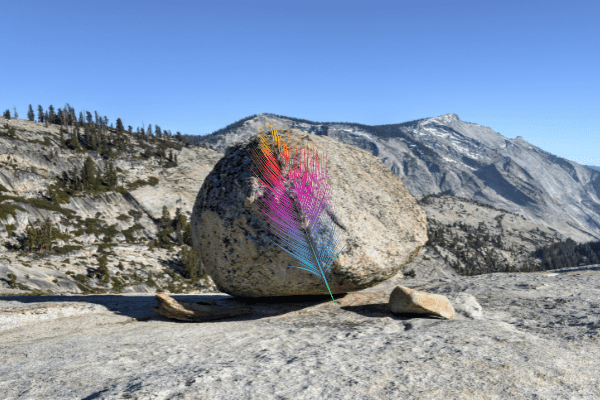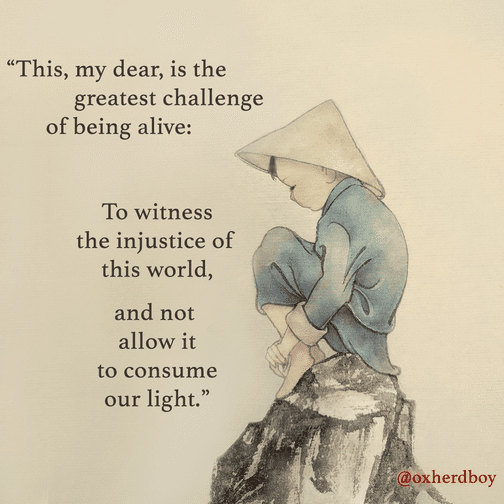The Tale of the Feather of a Bee Hummingbird and a Glacial Boulder
By Anon
During a recent phone conversation with a GP locum about my daughter’s depression, he said something bewildering:
He apologised to me about her autism.
Stephen Fry infamously said that, if offered the option of pressing a button to release his manic depression (Bipolar Disorder), he wouldn’t press it, “for all the tea in China.” This was despite his own hugely traumatic experiences.
We’re huge fans of The Matrix films in our house – eagerly awaiting the imminent fourth film.
There’s a classic scene in the original 1999 film, when Morpheus offers Neo a blue or red pill. Choose the blue pill: the story ends – wake up and believe whatever you want to believe. Choose the red pill: stay in the unsettling wonderland – see how deep the rabbit hole goes.
Despite her own traumatic experiences, my Matrix-loving daughter said that she wouldn’t press a button to end her autism.
In a sense, she continues to live in a red pill universe – with her eyes wide open. Others, by comparison, seem content to dwell in a blue pill haze.

This was illustrated, after a recent school history lesson on the Middle Eastern conflict. The class learned about the 1972 Munich massacre, with the Palestinian militia group, Black September.
Reeling from the lesson, my daughter described equally, the horror of the massacre, and her disgust at classmates making jokes and not taking the lesson seriously.
She simply said, “why do people want to kill each other – and why do my classmates find that funny?”
My Matrix-loving, ignorance-hating daughter lives every day as an empath.
Friends?
During Lockdown, we worked our way through all 10 seasons of the US sitcom, Friends. During the first episode of season two (‘The one with Ross’s New Girlfriend’), Chandler has an uncomfortable experience with Joey Tribbiani’s tailor.
It transpired that the tailor “cupped” Chandler’s genitalia whilst measuring his inside leg. However, the Tribbiani family had been loyal clients of the tailor for generations – and Joey exclaimed, “that’s how they do pants!”. Ross and Chandler then humiliate Joey in typical Friends-fashion.
Friends was mainly filmed in front of a live studio audience, and the audience laughed loudly at Joey’s inadvertent faux pas.
At the end, as the credits rolled, my daughter sat very still, clearly mulling over something, then finally saying:
“Why do Ross and Chandler tease Joey, and why is the audience laughing at Joey’s sexual abuse? He was 15 years old when he first went to the tailor.”
For a week, she boycotted Friends, needing time to process her fury at a third of the Friends cast and the live studio audience, for laughing at sexual abuse.
Just like with the school history lesson, she was processing the horror of abuse and inappropriate laughter as a response.
At this juncture, I could have replied to the GP locum: “Surely in these two cases, my daughter’s response shows more humanity and compassion?”
Throughout various news events such as the recent acquittal of Kyle Rittenhouse, migrants drowning in the English Channel, and the unsatisfactory results of COP26, my daughter has raged against archaic white, colonial supremacy, cried for the koalas in Australian bush fires and freezing turtles in the Gulf of Mexico.
Is there anyone available to soothe eco-anxiety?
Balm Remedies for the Soul
We have decided to create our own ‘balm remedies’ for the soul:
1) Hike at least once a week. Wear hiking boots, signalling a temporary retreat into the wilderness. Walk in the rain, snow and wind. Circle the sky with our fingers. Inhale the pine trees or heather. Walk like a tortoise, to slow the mind of an empath.
2) Talk about the small stuff: “should I grow my hair?”, “Why does American spelling permeate everything?”, “Does Taylor Swift monetise her love life through songwriting?”, “Is it wrong that I love Cinnamon buns?”, “Should tomato ketchup go in the fridge?”.
3) Talk about the small stuff, so when the big stuff happens, you’ve already walked the path ahead. If anxiety clings to you like an octopus tentacle, or depression weighs you down like a glacial boulder, you might be able to catch someone’s eyes, write an SOS or say it aloud.
4) Donate to charities that rescue migrants, champion a greener future and support victims of sexual abuse. This can propel a sense of doing something externally, to quash the overwhelming internal rage. We might not be able to totally eradicate these issues but we are actively engaged in supporting charities that campaign on our behalf for a better world.
5) Enlist the support of a great Clinical Psychologist, using CBT to view situations in a different, less overwhelming way.
My daughter had been feeling depressed for four weeks before she told me. That’s 28 days and nights. Not a bit blue or a bit down: Intrusive suicidal thoughts that were amplified at night, like pulsating heavy metal Gregorian chants.
We phoned the GP locum, who apologised, and booked a blood test.
My daughter contacted a mental health chat line, who told her to join clubs and make friends.
We spoke to the SENCo (Special Educational Needs Coordinator), who phoned CAMHS (Child and Adolescent Mental Health Services).
I asked her if she could write down how she felt at school. She sighed, as if the glacial boulder might triple in weight.
But she typed. And typed. And typed.
She used swear words because sometimes they are the only words you can use.
Her words told a story of a lonely girl at Primary School who went to a huge Secondary School and became even more lonely.
She was bullied at Primary School and then hung on to new friends at Secondary School – changing who she was, laughing at jokes she shouldn’t have, just for a seat at the table.
Gradually my daughter realised that these were fake friends, golden paint covering wooden dolls, not statues. Not Gods, not idols – just other kids trying to get through the day . But not the kind she needed. She stood alone – like a wolf in the forest with no pack. Surrounded by kids making homophobic jeers to each other, casually telling each other to kill themselves. It’s the stuff of nightmares.
The Feather & the Boulder
At first she didn’t notice the tiny pebble, in its naissance, as light as a feather of the bee hummingbird.
Gradually, the pebble grew into the glacial boulder – the weight of the loneliness of having no friends, the rage at the live audience for laughing at Joey Tribbiani, the classmates for laughing about the Munich massacre, the wasted opportunities of COP26, the pressure of looming GCSE subjects, desperate mothers and their babies drowning in a freezing English Channel: the unsettling ‘wonderland’ of the red pill.

But still, though surely tempted, she wouldn’t press the button to be without “all these feelings”, because it’s feelings that make us who we really are.
The typing marathon had tied down the glacial boulder to the page. That night, the glacier started to thaw slowly. By examining her glacial boulder, we start to see its layered complexity. Empaths feel the wounds of Earth: the energy of others’ pain, injustice and suffering. The sheer intensity of such concentrated feelings is overwhelming, rending empaths exhausted, burnt out, and sometimes struggling to get out of bed.
Frazzled Souls & Stark Statistics
To dilute the concentrated feelings, we must anoint ourselves with balm remedies for our frazzled souls.
The World Health Organization reports that, globally, 1 in 7 children (aged 10-19), have a mental health issue – with suicide being the 4th leading cause of death amongst 15–19 year-olds¹.
In the UK, the statistics are even more stark: Young Minds reports that 1 in 6 young people (aged 5-16), have mental health issues. And, in 2019, suicide was the leading cause of death for both males and females (aged 5-34)2.
These are grim and timely reminders that mental health must remain a priority in education, healthcare, communities, families, religious institutions, prisons, government focus groups, talk shows and influential social media accounts.
Depression is a serious mental health condition. It is not enough to plaster classroom walls with “Positive self-talk” posters or to practise mindfulness in Primary Schools. We need to stop cutting mental health services and reduce the waiting times for CAMHS referrals. There is no single prescriptive remedy for reducing depression amongst teenagers, but perhaps reducing exam pressure in schools might help?
The average GCSE student can expect to sit somewhere in the region of 20 to 30 individual exams, as we stick steadfast to the traditional exam-focused method of educational assessment.
In 2021, Childline saw a spike in phone calls related to exam stress, having more than doubled from the previous year (861 in 2020 & 1,812 in 2021)3.
In 2016, a report carried out by Children’s World ranked England 13th out of 16 countries in an international happiness table for children’s life satisfaction4. The report’s co-editor, Professor Jonathan Bradshaw (University of York), found worrying concerns about bullying, body image, school pressures and self-esteem. The results mirrored their previous findings for slightly older demogaphics.
Bradshaw contrasted the UK with Norway, where happiness levels are higher, but educational attainment lower. He postulated whether there needs to be a bit of a “trade-off” – a better balance between wellbeing and exam grades.
Red Pill Universe
Whilst my daughter’s glacial boulder is thawing, we still hike in the wilderness – like a tortoise, to slow her empath mind. No doubt, she will continue to live in her red-pill universe – eyes wide open to all the injustice and suffering in the world.
It will be hard: there might be more depressive episodes, but I suspect she will sit at her own table – and one day, one person – perhaps another empath, will ask to join her.
For now, we must gain fellowship wherever it may surface. And one rich seam of empathy we’ve recently tapped into is ‘The Oxherd Boy’5. Regina Linke’s online ‘balm remedy’ takes the form of beautiful works of art that communicate heartfelt Buddhist, Taoist and Confucian philosophies.
If ever there was a quotation that perfectly encapsulates the daily struggle of the empath – this must be it:

This article does not claim to speak for the autistic community. It is the story of an individual empath, and a family’s experience of autism and depression.

